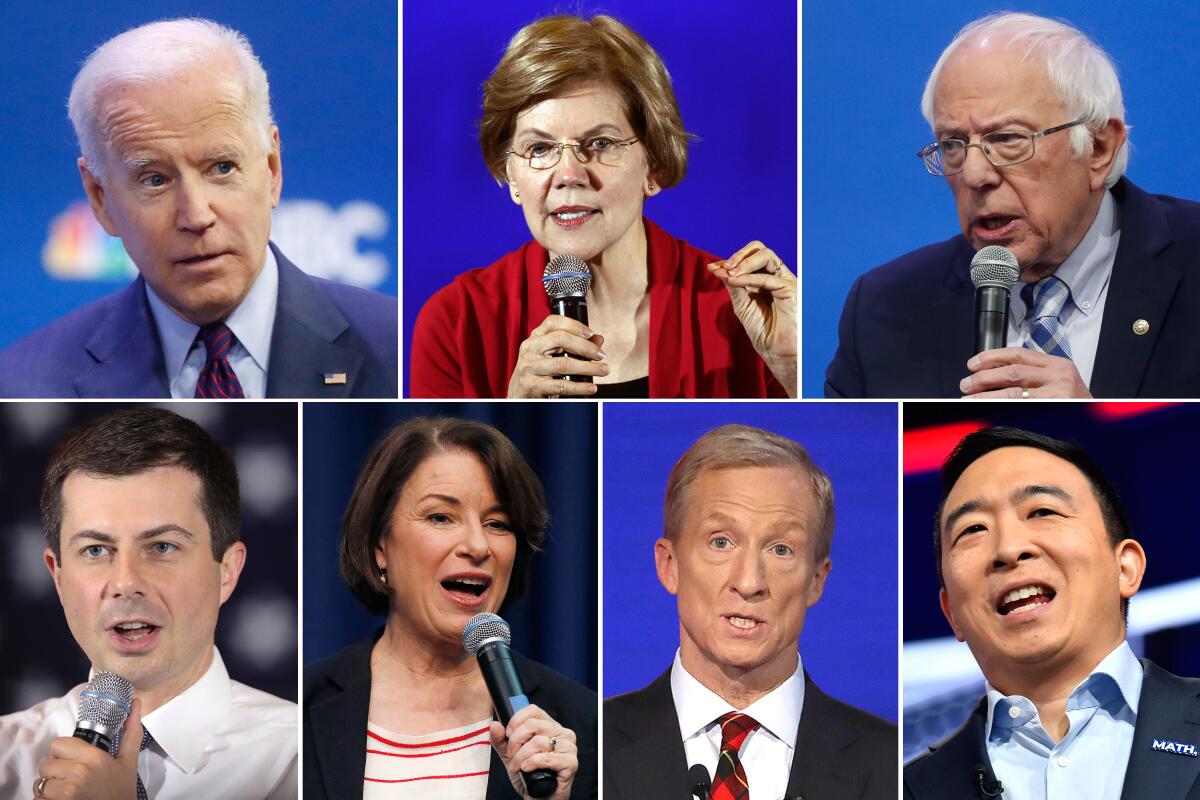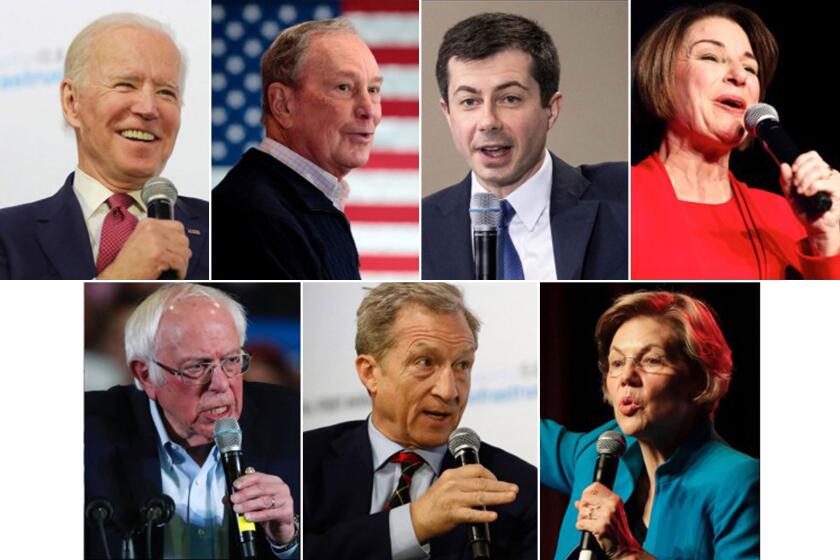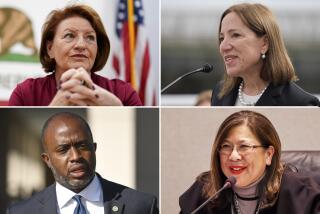What time is the December Democratic debate in Los Angeles?

The Democratic debate drama started well before the candidates even arrived in Los Angeles for Thursday’s faceoff, with speculation swirling about whether they would show up. Would the event even take place?
The Democratic debate in South Carolina is one of the last (free) chances presidential candidates have to make their case to voters in that state.
Were the candidates feuding? Why would they not show?
Sure, maybe some of them aren’t on the chummiest of terms, but that’s not what put the debate at risk. A labor dispute at host Loyola Marymount University led the candidates, one by one, to announce on Friday that they would not cross a picket line to climb onstage. But that’s settled, mostly (more about that later), and the sixth Democratic debate is expected to go ahead as scheduled, right here in sunny SoCal.
So pour yourself a glass of cheer and get ready for the holiday tradition of political arguments and finger pointing, this time with seven presidential candidates doing the honors over three — yes, three — hours.
What time does the debate start?
The debate, sponsored by PBS NewsHour and Politico, is scheduled for 5 to 8 p.m. Pacific time. It will air live on PBS and CNN, and will be streamed through the media partners’ apps and digital platforms. The event will be moderated by PBS’ Judy Woodruff, Amna Nawaz and Yamiche Alcindor, and Politico’s Tim Alberta.
So what makes Thursday night’s debate different from the five that preceded it?
It will feature the fewest candidates on a debate stage all year, meaning viewers might get a greater view of policy differences, rather than rapid exchanges between candidates and moderators.
And this will be the first time Democratic presidential candidates have debated in Los Angeles since 2008, when Hillary Clinton and Barack Obama faced off at the Kodak Theater in Hollywood. (Republicans last debated in Southern California in 2015 at the Ronald Reagan Presidential Library in Simi Valley).
The decision to hold the debate here is a nod to California moving up its presidential primary to March 3. (And maybe, just maybe, because Democrats wanted a break from campaigning in frozen Iowa and New Hampshire.) Political pundits are skeptical that the state will have a huge impact on the race, but at least the candidates are paying more attention to voters in the most populous state in the nation instead of just flying here to hobnob with donors.
Candidates in the December Democratic debate want to scrap Trump policies. But where do they differ on healthcare, immigration, climate, gun control and housing?
Which candidates made the cut?
The seven who qualified are former Vice President Joe Biden; Sens. Bernie Sanders of Vermont, Elizabeth Warren of Massachusetts and Amy Klobuchar of Minnesota; South Bend, Ind., Mayor Pete Buttigieg; billionaire hedge-fund manager turned eco-philanthropist Tom Steyer; and entrepreneur Andrew Yang.
What about the new guy who has already spent $117 million of his own money on ads?
Nope. Billionaire Michael R. Bloomberg, the former three-term mayor of New York City, will not be onstage.
Why not?
He didn’t meet the polling and fundraising thresholds set by the Democratic National Committee, which has been raising the bar to qualify for debates over the course of the year. Candidates needed to hit 4% in four national polls, or 6% in two early-state polls. Additionally, they needed donations from at least 200,000 people (including at least 800 donors from each of at least 20 states or territories).
Bloomberg, who joined the race Nov. 24, did not reach either benchmark. He has two polls that count toward qualification. But he is funding his campaign with his own fortune — worth $55.5 billion, according to Forbes — so he isn’t trying to meet the donor requirements.
Three Democrats had enough donors to qualify, but didn’t poll well enough: New Jersey Sen. Cory Booker, former Housing Secretary Julián Castro and Rep. Tulsi Gabbard of Hawaii. (Though Gabbard said she planned to skip the debate even if she did qualify. So there.)
One other candidate had qualified for the debate, but she dropped out of the race: California’s very own junior senator, Kamala Harris. After a sparkly debut and high expectations, Harris ended her presidential bid this month, saying she didn’t have the money to go forward.
Are the DNC debate criteria causing any drama?
They always do, and this year is no different. In a historically diverse Democratic field, only one candidate of color — Yang — will be on the stage in L.A.
This has led to complaints from Booker, who argued that the DNC ought to lower the threshold for the January and February debates. Booker, Castro and the seven candidates scheduled to debate Thursday signed a letter sent to party leaders on Saturday urging the DNC to use either a polling or a fundraising requirement, but not both.
The party will also face a quandary if Bloomberg continues to rise in the polls. The self-funding candidate won’t meet donor requirements, but voters weighing whether to support him would be better served seeing him in a debate setting, as opposed to only in scripted television ads.
Let’s not get ahead of ourselves. What should voters look for in Thursday night’s debate?
Buttigieg, who is the youngest in the field at 37, has been rising in the polls and facing increased attacks about whether he has the experience necessary to lead the free world. Warren has lost some of her summer luster and has been increasingly contrasting her record with her rivals’. Watch this pair to see how they handle or wage attacks on Thursday.
Also, the DNC is expected to raise qualifications for the next debate. So for the lower-tier candidates, Thursday may be best opportunity to have a moment that helps them land a spot onstage in Des Moines on Jan. 14 — less than three weeks before the first nominating contest in the nation, the Iowa caucuses.
Wasn’t the debate supposed to be at UCLA?
Yes, it was. The debate was scheduled to take place at UCLA’s Luskin School of Public Affairs. But in early November, the American Federation of State, County and Municipal Employees asked Democratic candidates to honor its three-year boycott of events at the University of California. The powerful union’s members include patient-care workers who are in protracted negotiations with the UC system. The following day, the DNC announced the debate location would be moved to Loyola Marymount.
Then the union dispute at Loyola Marymount nearly derailed the debate again, with all seven candidates on Friday saying they would honor a planned picket line. The dispute was between Unite Here Local 11, which represents about 150 campus employees, and Sodexo, a food services contractor on the private university’s campus near LAX. But the union announced a tentative agreement on Tuesday.
So that’s one dispute that appears to be settled. But given that it’s the holidays, it’s safe to say there will be plenty of arguments, tension and eye rolls to go around Thursday. Consider it a dry run for family gatherings. Cheers!
More to Read
Get the L.A. Times Politics newsletter
Deeply reported insights into legislation, politics and policy from Sacramento, Washington and beyond. In your inbox three times per week.
You may occasionally receive promotional content from the Los Angeles Times.













